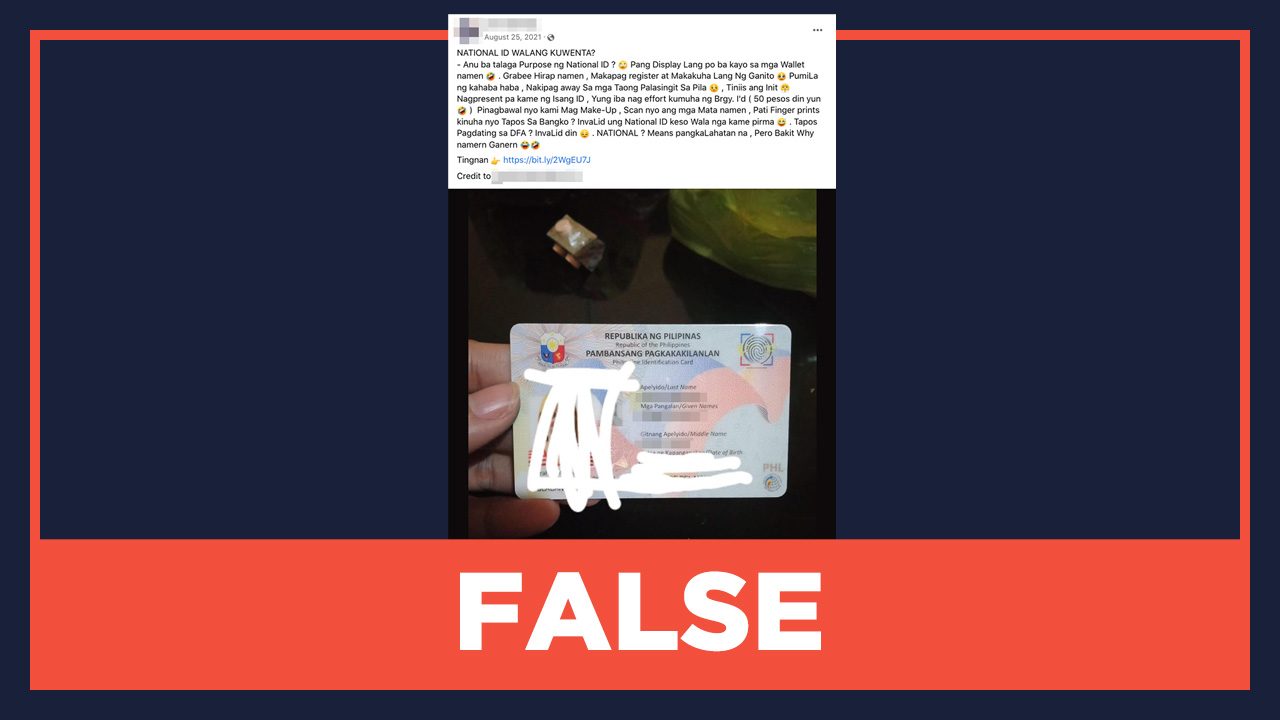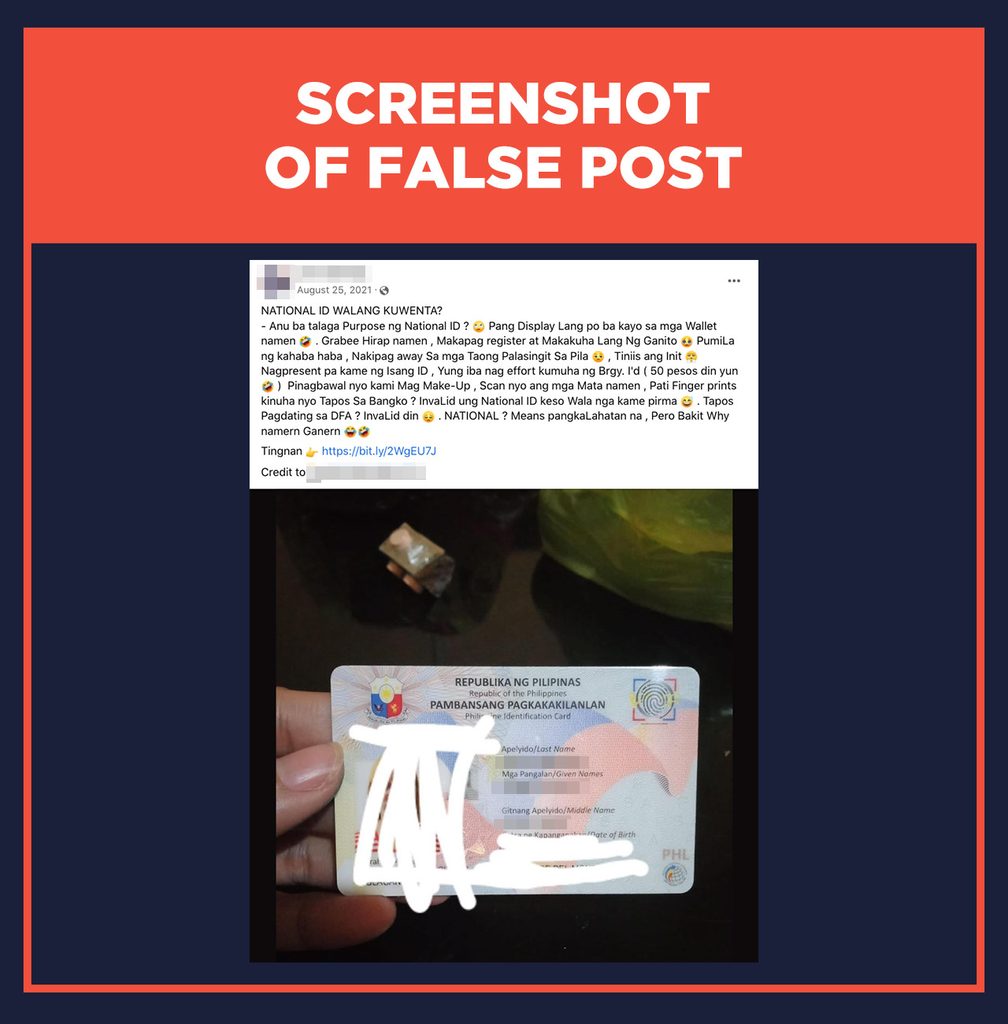SUMMARY
This is AI generated summarization, which may have errors. For context, always refer to the full article.

At a glance
- Claim: Philippine Identification (PhilID) is not valid and not accepted in government and private transactions.
- Rating: FALSE
- The facts: On February 14, President Rodrigo Duterte signed Executive Order No. 162 s. 2022, institutionalizing the acceptance of the Philippine Identification System Number as sufficient proof of an individual’s identity and age in all government and private transactions.
- Why we fact-checked this: The Facebook post has 12,000 reactions, 5,400 comments, and 40,000 shares, as of writing.
Complete details
A post has been circulating online, claiming the Philippine Identification (PhilID) card is not valid and not accepted in government and private transactions.
PhilID is the official national identity card for Filipino citizens worldwide. The Philippine Identification System was created through Republic Act No. 11055, signed on August 6, 2018.
The Facebook post questions the purpose and validity of PhilID in government and private transactions.
The post caption says, “Anu ba talaga Purpose ng National ID ? 🙄 Pang Display Lang po ba kayo sa mga Wallet namen 🤣 . Grabee Hirap namen , Makapag register at Makakuha Lang Ng Ganito PumiLa ng kahaba haba , Nakipag away Sa mga Taong Palasingit Sa Pila 😒 , Tiniis ang Init 😤 Nagpresent pa kame ng Isang ID , Yung iba nag effort kumuha ng Brgy. I’d ( 50 pesos din yun 🤣 ) Pinagbawal nyo kami Mag Make-Up , Scan nyo ang mga Mata namen , Pati Finger prints kinuha nyo Tapos Sa Bangko ? InvaLid ung National ID keso Wala nga kame pirma 😅 . Tapos Pagdating sa DFA ? InvaLid din 😔 . NATIONAL ? Means pangkaLahatan na , Pero Bakit Why namern Ganern.”
(What exactly is the purpose of the National ID? Is it just a display in the wallet? We went through all the trouble to register and this is all we get. We lined up for a long time, fought with the people in the queue, endured the heat, we presented an ID, the others made an effort to get barangay ID that costs P50. We were asked to remove our make-up, you scanned our eyes, you even took fingerprints. But the banks don’t acknowledge the card because it doesn’t bear our signature. At the DFA, it’s also considered invalid. Doesn’t national mean general? So why is the ID not accepted in some places?)

The Facebook post is still being shared. As of writing, it has 12,000 reactions, 5,400 comments, and 40,000 shares.
This claim is false.
On February 14, President Rodrigo Duterte signed Executive Order No. 162 s. 2022, institutionalizing the acceptance of the Philippine Identification or Philippine Identification System Number as sufficient proof of an individual’s identity and age in all government and private transactions.
The Philippine Statistics Authority (PSA) released an advisory on May 29, 2021, urging the acceptance of the PhilID card in all government and private transactions: “The PhilID card shall be accepted as sufficient proof of identity, without the need to present any other identification documents.”
The Department of Foreign Affairs, Bangko Sentral ng Pilipinas, and Department of the Interior and Local Government, among others, released statements that their offices had started accepting the PhilID.
According to Section 19 of RA 11055, non-compliance with the law – like refusing to accept, acknowledge, and/or recognize the PhilID card as the only official identification of the holder without any sufficient cause – carries a fine of P500,000.
The Facebook post is still being shared after February 14, despite Duterte releasing Executive Order 162. – Owenh Toledo/Rappler.com
Owenh Toledo is a graduate of Rappler’s fact-checking mentorship program. This fact check was reviewed by a member of Rappler’s research team and a senior editor. Learn more about Rappler’s fact-checking mentorship program here.
Keep us aware of suspicious Facebook pages, groups, accounts, websites, articles, or photos in your network by contacting us at factcheck@rappler.com. You may also report dubious claims to #FactsFirstPH tipline by messaging Rappler on Facebook or Newsbreak via Twitter direct message. You may also report through our Viber fact check chatbot. Let us battle disinformation one Fact Check at a time.
Add a comment
How does this make you feel?
There are no comments yet. Add your comment to start the conversation.